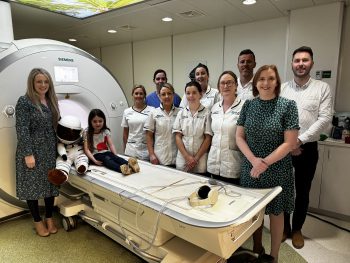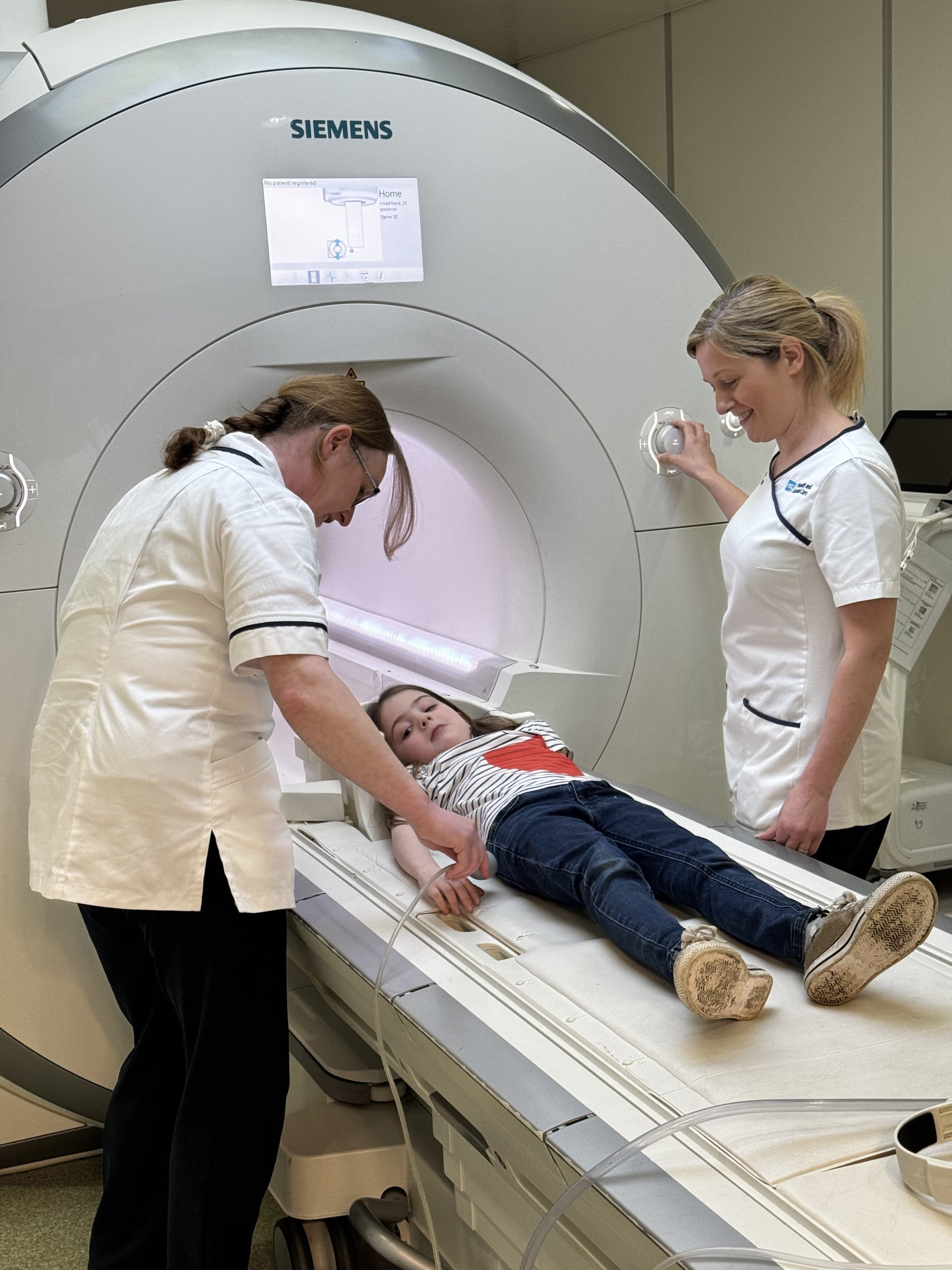12th March 2024

An innovative project within the Southern Health and Social Care Trust has been praised for improving waiting lists and making a real difference to children and their families.
The MRI Scan Project group have successfully reduced the number of children needing a general anaesthetic (GA) for a MRI scan, decreasing the waiting time for the children involved in the project by an average of 92 weeks.
An MRI (magnetic resonance imaging) scan uses a magnetic field rather than X-rays to take pictures of a child’s body and usually lasts between 20 minutes and an hour.
Sinead Hannan, Consultant Clinical Psychologist, said:
“Dr Lesley Ann Funston (Consultant Paediatrician) identified an area for improvement within the Paediatric MRI pathway. Children between four and eight years are automatically placed onto a waiting list for an MRI with GA as standard practice as the scan requires them to lie motionless for long periods in a narrow, noisy tube whist images are taken, which given their young age can prove a difficult and anxiety provoking experience.
“Average wait times for this scan were sitting at two to three years which is much longer than what we would want for any patient and so following discussion with our Lead MRI Radiograoher Julia Baltacioglu, a steering group was formed to explore an alternative approach to ensure that the same images can be achieved without resorting to a GA.”
The new clinical pathway was delivered through the Psychology, Paediatrics, Radiology and Radiography teams. The multi-disciplinary teams with parents as co-therapists in their child’s care, used psychological techniques to equip children with the skills needed to understand and cope with the procedure. Overall the quality improvements made through the project have had a significant positive impact on patient care and safety.
“The psychological intervention used a guided-management approach, which empowered families to prepare their children at home for the MRI using novel, fun and bespoke skill learning and exposure techniques, such as devising a bespoke regulation booklet for children and parents to learn coping skills and for parents to teach children to learn to lie still using a statue game; an art based activity for families to spend time together and discus the MRI experience; exposure using a Virtual Reality (VR) cardboard headset gifted to all families where they could view an MRI journey with visual and auditory sensory experiences. We also added in a chance to visit the MRI department for a real work walk-through and a warm introduction to the MRI team. For any children who were experiencing significant anxiety, we provided additional sessions to teach further psychological resources.
“We are extremely pleased that 94% of the children (47/50) who were part of the project did not have to undergo a general anaesthetic for the MRI scan, making it a much easier, calmer and safer experience for them and their families.
James Fallis, Associate Psychologist, added that overall patient satisfaction improved greatly.
“Parents provided really good feedback about how their child has learnt skills on how to manage their stress and procedural anxiety and general anxiety about going for an MRI scan.”
 Ruth Camlin’s daughter Elsie was one of the children who was part of the project.
Ruth Camlin’s daughter Elsie was one of the children who was part of the project.
“The whole team have been amazing. They gave us a walkthrough of the MRI, explained to us about lots of activities that we could undertake, such as building a 3D scanner of an MRI and social stories.
“One of the things that we felt really helped was playing the sound of the MRI machine. We played it in the background, turning the volume up gradually to build Elsie’s resilience to the noise as she’s quite sound sensitive. We also practiced with head phones that were given to us by the team. All this really helped and by the time it came for Elsie to have her MRI, she was actually quite excited about it.”
Ruth added that this intervention has had a lasting effect as Elsie also had to undergo an emergency MRI but was able to get this done quickly without the need for GA.
“We have also found other benefits as it has helped with other aspects of her healthcare, as Elsie is no longer anxious about getting her bloods taken”.
Colm McCaffery, Director of Children and Young People, said that this project is a great example of the significant impact that a small change can make in improving patient care.
“Waiting for a diagnosis can be a worrying time for parents and children who require an MRI can feel scared and anxious as the noise, vibration and claustrophobia from MRI machines can lead to them becoming upset and/or scared.
“It is heart-warming to hear the positive feedback from families that this project is making a real difference. Avoiding a general anaesthetic means the process is less stressful for the child and their family and it saves time, money and resources.
“The project’s success is a result of the compassionate care and commitment of all administrative, clinical and management staff, working in partnership to improve service delivery.”
Whilst the initial focus of the project was four to eight year olds, the team are delighted that a three year old child has also been able to be supported through as well as having older children who have additional support needs.




